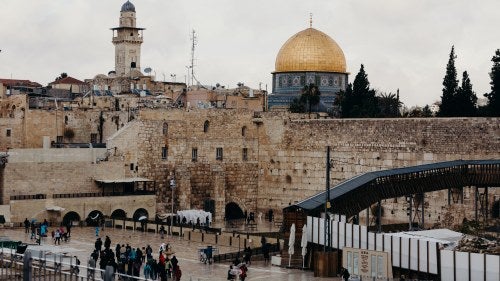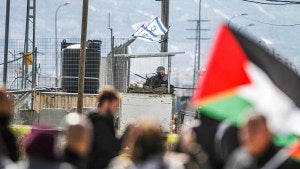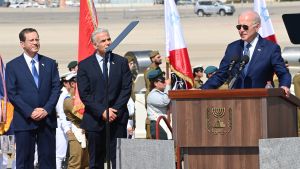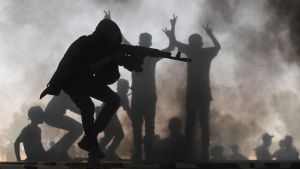Pathways to Peace: Reflections on the Israeli-Palestinian Conflict

Despite 75 years of struggle, two scholars remain cautiously optimistic about the future.
2023 marks the 75th anniversary of Israel’s independence and of the Israeli-Palestinian conflict, one of the longest-running clashes in modern history. Unfortunately, it is also on track to become one of the conflict’s bloodiest, if not the deadliest year yet. The United Nations Office for the Coordination of Humanitarian Affairs reports that as of March 10, 83 Palestinians and 13 Israelis have died, while 2,295 Palestinians and 40 Israelis have been injured. Tensions remain at an all-time high in the wake of Israeli military raids on Palestinian population centers, targeted attacks against both Israelis and Palestinians, inciteful statements made by far-right members of the Israeli government, persistent military activity by Hamas in the Gaza Strip, and continued settlement expansion in the West Bank.
To capture the significance of this moment, we interviewed two experts on the subject: Tariq Kenney-Shawa, a Palestinian American researcher at Al-Shabaka, and Ilai Saltzman, an Israeli professor at the University of Maryland. Here’s what they had to say about the present state of affairs and the growing influence that emerging youth have on the direction of the conflict.
How has your upbringing shaped your perspective on the conflict?
Tariq Kenney-Shawa (TKS): Growing up, my parents had hoped I’d have a life and career of my own, and not feel pressured into advocating for Palestinians. However, this ended up backfiring in a way. By taking a hands-off approach, I was able to see how the conflict affected my dad. One of my earliest memories was seeing him watch news coverage of Israeli airstrikes in 2008, trying desperately to get in touch with family. As I became aware of my identity as an early teenager, it quickly turned into a span of years of learning and teaching myself about history, because oftentimes Palestinians feel like they’re responsible for defending their history and political positions at a young age. Going to college, I started focusing more on research. My thesis examined the failure of the two-state solution. After graduate school, I then began to pursue the advocacy route, leading me to my current role at Al-Shabaka where I study solutions and draft policy proposals.
Ilai Saltzman (IS): Israelis, both Jews and non-Jews, are born into the conflict. You’re not only born into it, it’s omnipresent. Both the Israeli-Arab conflict and the Israeli-Palestinian conflict. Things happen, you watch the news, read the papers. You have friends who are either involved or participate in events that are functions of the conflict, whether that’s an older brother that goes to war or a terrorist attack that kills someone you know. One of the key things parents say to their kids is, “By the time you’re 18, I hope you don’t have to go into the army.” You breathe, sleep, and dream about the conflict. As a scholar, I tried to avoid focusing on Israel for a long time. I kept asking myself, how does an Israeli examine Israeli foreign policy objectively? I realized, though, that Israel is not an island; it impacts the foreign policy of others. So, I try to be interdisciplinary and multi-focused by studying a variety of topics that affect or are affected by Israel’s foreign and security policies.
Where do you see this conflict headed?
TKS: People have long thought the two-state solution was possible, that there could be an end point to work toward. The two-state solution is gone, and the alternative is the one-state apartheid reality we currently see on the ground. If the Palestinian movement can shift to one focused on rights, it holds more potential for everyone having equal rights. However, the path to getting there is bloody.
IS: In the short term, both Israelis and the Palestinians are in shambles. Israelis’ energy is focused on judicial reform. In the short term we’ll likely see more of the same, trying to maintain the status quo. The government doesn’t have the bandwidth to do anything. Mahmoud Abbas is in his last days. He was elected in 2005 and will eventually fade away from the political scene. This could be a game-changer for the dynamics on the ground. His death could open up a whole can of worms, a power vacuum without a legitimate heir apparent. In the medium to long term, the world’s public opinion is largely tired of the Palestinian issue and more interested in Ukraine, China, Iran’s nuclear program. Palestinians don’t occupy the same attention as they did in the '60s, '70s, and '80s. I’m more optimistic about the long run because of some of the foundations on the ground.
What do you believe is the most effective approach to solving the conflict, from the top down or from the bottom up?
TKS: The only way Palestine will be liberated is going to be through a movement driven by Palestinians on the ground in Palestine, a movement that encapsulates a lot of tactics like peaceful boycotts, sanctions, and nonviolence. It’s a collective process of each person doing their part to do what they can do best.
IS: In the 1990s, the idea was top-down. In the '70s and '80s, it was top-down as well. The 1990s showed it’s not enough to have peace at the head of state level, you need to talk to people and have peace trickle down. It needs to be a simultaneous two-pronged approach, signing agreements on the one hand and advocating for peace on the other. Everyone needs to have a part in peace, otherwise it’s easy to lose.
What role do youth today play in determining the outcome of this conflict?
TKS: In the US, we’re seeing this narrative shift that more people are espousing pro-Palestinian views and becoming critical of Israeli policy. The question is when the narrative will shift and change US policy.
IS: Israelis are pretty polarized politically at present, they’re either extreme optimists or extreme pessimists. From a pessimist perspective, young people in Israel are more pessimistic than their parents and grandparents. They’re more religious, conservative, and nationalistic—opposite to youth in the United States that are often more progressive. This is why leadership is key. You can turn things around, reframe the conversation. It takes a lot of energy, a lot of focus, but it’s possible.
What keeps you hopeful in your work?
TKS: You have to approach the subject with optimism. Hope lies in changing public opinion and shifting the narrative, but ultimately, it’s a waiting game. At the end of the day, so much bad policy is driven by old men. When older generations die off, their views die with them.
IS: Pessimistic optimism is hoping a leader comes along and changes things. My optimism comes from the belief that all parties will one day be ripe enough to move beyond the conflict. Ripeness matters a great deal, not only at the leadership level but at the societal level as well. Just think about Europe, where hundreds and hundreds of years were disastrous. But after all these massive military campaigns, states were ultimately able to reach the conclusion that conflict was untenable and peace was needed. They not only stopped fighting each other but integrated into a community.


Related Content
 Public Opinion
Public Opinion
Public opinion signals the conflict is in dire need of stronger leadership and more practical policies.
 Public Opinion
Public Opinion
As attention returns to Gaza, majorities view a breakthrough in negotiations as unlikely in the foreseeable future.
 Public Opinion
Public Opinion
After violent conflict between Israel and Hamas, a new Israeli governing coalition, and Palestinian repression, what would a peaceful future look like?